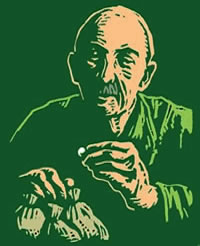
17th Sunday in Ordinary Time Year A
The collection of parables of ‘the Kingdom’ that we conclude today is the centrepiece of Matthew’s gospel. He closes this section with an autobiographical note. As he tells the story of Jesus for a community from a Jewish background, he sees himself as ‘a scribe of the Kingdom’. The scribes who are often mentioned in the gospels were the rabbis who interpreted and taught the Law of old Israel. Matthew sees himself as an interpreter of the fulfilment of all the hopes of Israel brought by the Saviour. From the first, the apostles and their companions taught that the life, death and resurrection of Jesus were ‘according to the scriptures’. If the essential message of the scriptures was making known the ways of God, these ways were given a dramatic and final expression, they announced, in Jesus of Nazareth. Jesus is the new Moses, bringing the New Law of the Sermon on the Mount; he inaugurates a new Covenant in his blood; he establishes the new Temple that is his own body; he is the new David, the messiah exercising divine rule over God’s final Kingdom. As one great writer put it, in the light brought by Christ, the Scriptures ‘opened their heart for the rejoicing and astonished apostles’. The old figures and shadows have given way to realities beyond all the imagining of old Israel. Matthew shares in this enthusiasm, and sees himself as a ‘scribe of the Kingdom’, as he relates the old to the new.
But this fulfilment is mysterious, as the parables we have seen already make clear. A conversion is necessary if one is to recognise and appreciate the coming of the Kingdom announced by Jesus. Each parable presents a challenge – we must leave behind our too human way of seeing things and identify with the ways of God that have constituted the essential message of the scriptures from the beginning.
The parables of the treasure in the field and the pearl of great price emphasise this need for conversion. Identification with the ways of God that shape the Kingdom must be unconditional. In our Australian land, buried treasure is the stuff of fairy tales; but in Palestine, with its long history of kingdoms and empires, the possibility of finding a treasure trove was real. And if this happened, the treasure belonged to the owner of the site. One who had such a stoke of good fortune, Jesus says, would do all that he could to buy the field - and in a similar way, no other allegiance will rule the life of one who has found the joy of letting God’s word and God’s ways to be the measure of his or her life. The pearl for which the merchant sells everything has the same lesson. For ancient peoples, a pearl was the loveliest of possessions. The merchant of the parable will do whatever is necessary to acquire the pearl he has found that is without compare. This does not mean that he saw no beauty and value in the other pearls that he came across. Our choice of the values of the Kingdom does not mean that we should despise other worthy causes. The parable teaches us, however, that identifying with the Kingdom announced by Jesus means getting our priorities right. The parable of the dragnet has a message similar to that of the wheat and the weeds. It is not for us to make final judgment of the good and the bad - that belongs to the Lord. Meanwhile, the Church - through which the Kingdom is ‘present in mystery’ - is made up of a ‘haul of all kinds’. Following the example of Jesus, who reached out to prostitutes and sinners, the Church will never turn its back on those who are still struggling with the issues of life.
John Thornhill sm

